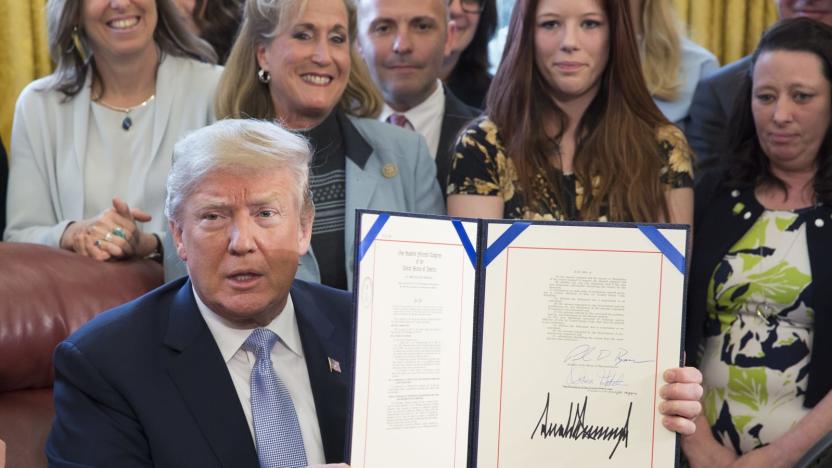unconstitutional
Latest

EFF and human rights groups sue to have FOSTA declared unconstitutional
The Electronic Frontier Foundation (EFF) and a number of other organizations and individuals have filed a lawsuit asking for FOSTA to be declared unconstitutional, with the EFF saying the law was "written so poorly that it actually criminalizes a substantial amount of protected speech." They're also pursuing an injunction that would prevent FOSTA from being enforced while a court considers the case. FOSTA was signed into law in April and though it claims to be an effort to stop sex trafficking, the flawed legislation features broad language, conflates sex trafficking and sex work and by many accounts, actually makes fighting sex trafficking more difficult. Among those speaking out against FOSTA and its sister bill SESTA were the ACLU, the Department of Justice, sex work rights organizations and sex trafficking victims groups.

Judge suggests Trump should mute followers instead of block them
Last year, the Knight First Amendment Institute at Columbia University sued Donald Trump, then White House Press Secretary Sean Spicer and White House Director of Social Media Daniel Scavino claiming that the president's blocking of individuals on Twitter is a violation of their First Amendment rights. The group argues that Trump's account constitutes a public forum and therefore, blocking US citizens from accessing it is unconstitutional.

Turkey's Constitutional Court: Twitter ban violates freedom of speech
Since Turkey blocked access to Twitter in late March -- in response to posts about the prime minister's alleged corruption -- there's been plenty of legal back-and-forth, with the ban even being lifted temporarily as judges weighed complaints against the government. Today's news might mean Twitter is back for good: The Constitutional Court ruled that blocking the social-media platform was unconstitutional on the grounds that it violates the right to free speech. Most importantly, the ruling requires Turkey to immediately restore access to Twitter. According to the Hurriyet Daily News, this ruling may be used as a precedent for similar cases in the future, possibly preventing authorities from imposing widespread bans like this again. It's unclear whether this ruling will also affect the country's ban on YouTube, which is currently in effect. In response to the ruling, Twitter's @Policy account tweeted: "We welcome this Constitutional Court ruling, and hope to have Twitter access restored in Turkey soon."

US Federal judge finds National Security Letters' gag provision unconstitutional
Woo, boy. You know those National Security Letters that the FBI has been issuing at its own discretion -- the ones Google has been doing its best to track? Judge Susan Illston of Federal District Court in San Francisco just found 'em unconstitutional. As the story goes, NSLs arrive from the factory with a gag order on the recipient, and as Illston sees it, forbidding the recipient from "disclosing that they had received such an order." So, she's suggesting that the whole thing should be banned under the First Amendment. Moreover, she's ordering the US government to stop enforcing the gag provision in any lingering cases, though she reportedly "stayed her order for 90 days to give the government a chance to appeal to the Ninth Circuit Court of Appeals." Needless to say, the move comes as a blow to the existing administration's surveillance practices, but something tells us this isn't the last word we'll be hearing on the matter. Hit up the links below for a look at the decision.

PROTECT IP Act called unconstitutional by bipartisan group of law professors
Turns out Eric Schmidt is not alone in his vehement opposition to the PROTECT IP Act, and the resistance is hardly partisan. A group of over 100 law professors signed a letter (jointly authored by Mark Lemley, David Levine, and David Post) arguing that the legislation working its way through congress is unconstitutional. The Supreme Court has previously ruled that speech can't be suppressed without the speaker being given an opportunity to defend his or her actions. Yet, under the bill being advocated for by the RIAA the MPAA, a judge can issue a temporary restraining order that will essentially shutdown a site based only on evidence presented by the government. The letter warns that, not only could overseas domain owners be cheated of the right to due process but, plenty of protected speech could be censored based a single piece of infringing material. As we warned, this can only get nastier and this nascent battle is still only just getting started. Check out the full letter at the source.

Tennessee law bans 'distressing images,' opens your Facebook inbox
Congratulations Tennessee! Governor Bill Haslam has put your state in the national spotlight and, for once, it has nothing to do with Bonnaroo or how bad the Titans are. The republican executive of the state signed a ban on "distressing images" into law last week that we're sure constitutional lawyers are going to have a field day with. Anyone who sends or posts an image online (and yes, that includes TwitPics) that they "reasonably should know" would "cause emotional distress" could face several months in jail and thousands of dollars in fines. The best part? Anyone who stumbles across the image is a viable "victim" under the law and the government doesn't even have to prove any harmful intent. So, Tennessee residents who aren't cautious enough using Google image search could get a few people in trouble. Another, and perhaps more perturbing, part of the same bill also seeks to circumvent restrictions on obtaining private messages and information from social networking sites without a search warrant. We give it about a month before this gets struck down on obvious grounds that it's unconstitutional.

Utah Governor vetoes video game and movie legislation [update]
It's game over in Utah, for now. Utah Governor Jon Huntsman (R) has vetoed the video game and movie retail restriction bill, which would have enforced strict penalties on retailers who sell M-rated games (and R-rated movies) to "buyers subject to an age restriction or recommendation." The legislation (HB 353), authored by Jack Thompson and legislator Mike Morle, recently swept the Utah House of Representatives by a 25 to four margin. According to GamePolitics, Jack Thompson claims the backers of the bill will seek an override of the veto. In a letter explaining his reasons for the veto, Huntsman says HB 353 would likely "be struck down by the courts as an unconstitutional violation of the Dormant Commerce Clause and/or the First Amendment." Huntsman estimates that a possible "unintended consequence" of passing the legislation would be that the industries most affected could choose to forgo the use of "age appropriate labels on goods and services," because of their voluntary nature -- hurting families in the long run. Huntsman full letter can be read after the break. Update: Michael D. Gallagher, president and CEO of the ESA has responded to the news in a comment, found after the break.

Minnesota pays ESA $65k in legal fees
The Entertainment Software Association (ESA) announced today that the state of Minnesota has paid $65,000 – that's $6.50 for every lake – in attorney's fees and expenses to the organization over its unconstitutional game law. The ESA claims it has now been awarded moneys totaling almost $2 million for fees and expenses incurred by defending the industry in other jurisdictions.Bringing out fightin' words, ESA CEO Mike Gallagher said that Minnesota's taxpayers should be "outraged" by having to pay this bill after its elected officials ignored precedent and pursued a political agenda. Gallagher wants politicians to get behind the efforts of the ESRB "rather than continue to pursue unconstitutional legislation."

Supreme Court's Scalia believes game laws could be constitutional
LawsofPlay's Anthony Prestia gained audience with US Supreme Court Justice Antonin Scalia to ask him what he thought about the game laws we've seen shot down one by one, by two, by three, over the years. Scalia, traditionally one of the most conservative members of the court, believes that constitutional precedent holds that minors may be subjected to prohibitions that adults aren't.Scalia's remarks imply that if a game law banning the sale of mature-rated games to minors ever made it to the docket he would affirm it -- really, no shock there. He clarifies that this would not put a ban on parents buying M-rated games for their children and that he believes video games (as long as it isn't declared "obscene") are protected by the First Amendment. As stated before, many lower courts clearly don't hold Justice Scalia's beliefs.[Via GamePolitics]

UK Constitution Committee to investigate surveillance overload
For those dwelling in England who enjoy a touch of privacy in their day to day lives, help could be on the way. Amidst the smattering of new surveillance methods being installed and implemented within the nation's border comes a second inquiry into the "constitutional implications" of such invasive measures. If you'll recall, the Commons' Home Affairs committee has already planned its own review, and now the UK's Constitution Committee will be "conducting an inquiry on the consequences of the collection and use of surveillance and personal data by the State." Basically, the group is trying to visualize just how damaging all these CCTV installations, car trackers, and behavior monitors are on the "relationship between individuals and institutions." Another aspect will be to scrutinize whether UK citizens need additional protection under the law from such voyeuristic tactics, and judging solely by the sheer multitude of surveying going on over there, we couldn't complain with a little extra shielding. [Warning: Word Document read link][Via El Reg]

Court rules that sly GPS tracking isn't unlawful
It's one thing to offload (illegally) a dozen or so GPS units from a storage facility and beg the police to nab you by leaving them turned on, but for the boys in blue to slide a tracking device into your ride to keep dibs on your doings, well that's another matter entirely. Earlier this month, the Seventh Circuit of the US Court of Appeals "ruled against a defendant who claimed that the surreptitious placement of a GPS tracking device amounted to an unconstitutional search," essentially giving the coppers the green light to add a GPS module to a suspicious ride sans a warrant. While we're sure the privacy advocates out there are screaming bloody murder, the district judge found that they had had a "reasonable suspicion that the defendant was engaged in criminal activity," and it seems that a well-placed hunch is all they need for lawful placement. Interestingly, the government argues that no warrant was needed since "there was no search or seizure within the meaning of the Fourth Amendment," but did add that "wholesale surveillance of the entire population" was to be viewed differently. So while this may come as a shock to some folks out there, it's not like your vehicles have been entirely devoid of data capturing devices up until now anyway, so here's fair warning to be on your best behavior when rolling about.





